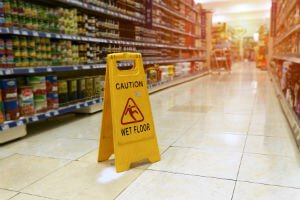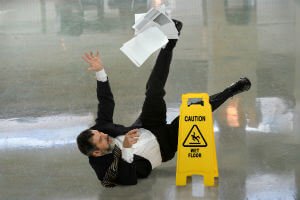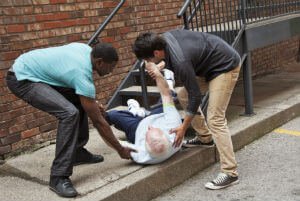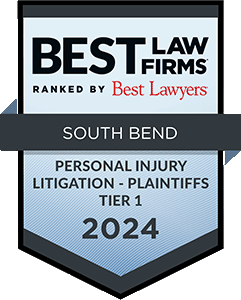 If you were injured in an accident on another’s property, you may be able to hold the property’s owner or manager liable for your damages. However, there are certain elements that must be present at the time of your accident to bring a valid premises liability claim.
If you were injured in an accident on another’s property, you may be able to hold the property’s owner or manager liable for your damages. However, there are certain elements that must be present at the time of your accident to bring a valid premises liability claim.
Below our South Bend premises liability lawyers discuss the elements we look for when reviewing a victim’s claim. To find out if you have a case against a negligent property owner, schedule a free, no obligation consultation with Pfeifer, Morgan & Stesiak. Our South Bend premises liability lawyers have outlined the elements of a premises liability claim so you will be informed of what is necessary when pursuing legal action. For assistance with your claim, contact us to schedule a free, no obligation consultation.
What Was Your Status While Visiting the Property?
One of the first things our attorneys will review is your status while visiting the owner’s property. There are three types of statuses visitors can be labeled as while visiting a property. Your status is decided by the reason you are visiting the property and whether the owner specifically invited you onto the premises.
Invitee
An invitee is someone who is invited onto the property for the benefit of the property owner, typically for financial gain.
Property owners have the highest duty of care to invitees and must make the premises safe for the individual. This includes clearing or correcting any known hazards that exist on the property, or adequately warning an invitee about a known hazard on the premises.
An example of an invitee would include a customer shopping at a store or dining at a restaurant. Another common example of an invitee is a repair or maintenance worker who was hired by the property’s owner.
Licensee
Licensees have express or implied permission from the property owner to enter the property, typically for the mutual benefit of the visitor and property owner. Licensees can include friends, family members or acquaintances who have been invited onto the property by the owner for entertainment or social purposes.
Property owners do not have as high of a duty of care to a licensee compared to an invitee. However, the property owner must take steps to warn of or fix concealed dangers on the premises that he or she knows about.
Trespasser
A trespasser is someone who has illegally entered a private property without the owner’s permission. Likewise, a person who remains on the property after he or she was asked to leave by the owner may be considered a trespasser.
Property owners do not owe trespassers a duty of care when they have illegally entered their home, business or land. However, property owners cannot willfully or maliciously inflict harm upon someone who is trespassing on their property.
Property Owner’s Duty of Care
For a premises liability claim to be valid, you must prove the property’s owner owed you a duty of care to ensure your safety. This means the property owner was legally obligated to either clear the property of any known hazard or provide you adequate warning about the hazard’s existence.
Typically, the degree of a property owner’s duty of care will depend on the reason you are visiting the property. For example, property owners have a higher duty of care to ensure the safety of invitees compared to licensees.
A Known Hazard Existed on the Property
Once you have established a duty of care, you will need to show the property owner either knew about the hazard that caused your injury, or should have reasonably known it existed on the property.
If you can show that the owner had knowledge or was aware that a dangerous condition had formed on his or her property, and neglected to correct the hazard, it may prove the owner breached his or her duty of care.
You Suffered an Injury
To hold a property owner liable for a premises liability claim, you must show that you suffered an injury while visiting the property.
This may be proven by using your medical records indicating the type of injury you suffered and its severity. Likewise, your treating physician or a medical specialist may testify on your behalf that your injury could not have been acquired under different circumstances and is not pre-existing.
Causation
The final step to proving a premises liability claim is showing that a causal link exists between the property owner’s negligence and your injury.
The property owner’s negligence must be a significant contributing factor to the injuries you suffered. You must be able to prove that your injuries were foreseeable and occurred due to the property owner’s knowledge, or lack of knowledge, about a hazard that existed on his or her property.
Schedule a Free Consultation with Pfeifer, Morgan & Stesiak
If you suffered an injury due to a property owner’s negligence, you may be entitled to compensation for your medical bills, lost wages, and pain and suffering.
The South Bend personal injury attorneys at Pfeifer, Morgan & Stesiak will review your claim and inform you of the legal options that may be available for pursuing compensation. Request a free, no obligation consultation today. There are no upfront fees and you only pay us if we recover compensation for you.
Call (574) 444-0741 to learn more about the options that may be available to you.











